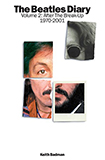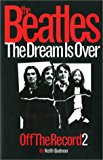- Timeline More from year 1988
Timeline
More from year 1988
Spread the love! If you like what you are seeing, share it on social networks and let others know about The Paul McCartney Project.
About
From Club Sandwich N°49, Summer 1988:
[…] Paul received an honorary doctorate from the University of Sussex at the Brighton Centre on Tuesday 12th July. (ITV news had a clip of Paul going up to the stage in his robes.) Others similarly honoured included former Prime Minister Lord Callaghan, who farms at Ringmer in the county, and Anita Roddick, who founded her revolutionary Body Shop chain (based on the ‘beauty without cruelty’ principle) in Brighton.
As you will have twigged, the qualifications for the honour are achievement in the wider world and a close Sussex connection. The 15 honoured on this occasion were chosen from over 100 nominees and, as University spokesman Mark Sudbury confirms, Paul’s award was something of a first.
“This is the first time we have made the award to a pop musician. We believe that is the first time that Paul has ever been given an honorary doctorate. It has been made in recognition of his outstanding contribution to the music business.“
And also, in part, in recognition of Paul’s continuing Englishness. Although “it is an Englishman’s inalienable right to live where the hell he likes” (W. Churchill, as quoted by J. Lennon), there’s no doubt that Paul’s continued experience of rain, cups of tea and football results has kept his music subtly attuned to the British psyche. If we for our part appreciate his decision to stay put, think how proud of him they must be in Sussex, where he and Linda have made their home and send their children to school.
The University of Sussex capped their decision to honour Paul with an equally imaginative choice of speaker to pay tribute to PMcC, Hon. D. Univ. This was novelist and Sussex graduate Ian McEwan: formerly an enfant terrible, The Child In Time (1987), while still a disturbing read, converted many who’d previously found him rather strong meat. Often on these occasions, the well-meaning eulogist lacks any great knowledge or understanding of his subject, but Ian scored high on both counts, as the following text shows.
When the histories of twentieth century music in the West come to be written, I suspect that the outstanding achievements of our time will not necessarily be seen to lie with the heirs of Beethoven and Brahms despite the genius of, say, Stravinsky or Britten. The major contribution of our century could well be in innovation rather than continuity, in the boundless elaboration and transformation of a simple five note scale into the blues, and into jazz in all its complex and proliferating forms and, later, tangentially, into rock and roll and popular music generally. Popular music has had by far the greatest impact, economically as well as culturally, of all these forms; its output has been mountainous; its products are mostly destined for instant oblivion; very little survives the decade it was written in. Against this background it seems right this morning to honour a quite contrary and exceptional talent, a man whose best work has already passed deep into the culture, indeed, into many cultures. There can be little doubt that as long as popular music exists, the work of Paul McCartney, and of Lennon and McCartney, will continue to be played and re-interpreted.
Before I say more of him as a composer, I should add that we honour him today as a musician too. As a bass player, he transformed expectations of what a bass line could achieve in a song; as a singer he has demonstrated extraordinary musicality, both in the slow, wistful songs at which he excels, and in hard, driving rock and roll songs for which he possesses a wide and accurate range without apparent break in register; and in the recording and production of his music, he pioneered in the sixties a seriousness, a perfectionist’s attention to fine detail, and an insistence on hard work which was once rare among rock musicians.
But it is as a composer that his name will survive him. His songs, like Cole Porter’s, will come to embody an era and a generation. He has a sure and instinctive grasp of the form. His melodies are both accessible and surprising; at their best they are uncloyingly sweet, just as certain Schubert lieder are sweet, just as certain melodies from The Magic Flute are sweet. As a lyricist his subject matter has ranged far beyond conventional declarations of love – one thinks of ‘Eleanor Rigby’, or the lucid story-telling of ‘She’s Leaving Home’.
To single out his achievements is difficult because his output over more than twenty-five years has been huge, and complicated by his early and fruitful collaboration with John Lennon. And one of his most popular songs, in fact, one of the most successful records ever released in this country, ‘Mull of Kintyre’, was made long after his association with the Beatles had ended. For many years his band, Wings, played numerous fine new songs by him and was dedicated to the idea of live performance worldwide. But, forced to make a choice, I would suggest as among his notable achievements his role, both in the conception, and as the guiding spirit in Sergeant Pepper’s Lonely Hearts Club Band, surely one of the finest and most influential pop music albums ever recorded. And from among dozens of superb songs, I would mention ‘Yesterday’, ‘Hey Jude’ and ‘Let it Be’. This last is beginning to assume the resonance and durability of a Wesleyan hymn. Any composer, in any idiom, would have been proud to create these melodies.
I shall end on a personal note. I arrived as a first-year student at the University of Sussex in 1967, the year of Sergeant Pepper. Both the nature of the new institution I was attending, and this wonderful music which resounded down every corridor, made me instinctively certain that I would never wear, or even see the mortarboard and gown to which three years later I would have a right. In the late ’60’s it simply wasn’t done to come and collect your degree. And so it is in celebration of an irony of time that dressed like this before the very prime mover of that music I say, My Lord and Chancellor, I present to you Paul McCartney for the Degree of Doctor of the University honoris causa.

Last updated on May 2, 2020
Going further
The Beatles Diary Volume 2: After The Break-Up 1970-2001
"An updated edition of the best-seller. The story of what happened to the band members, their families and friends after the 1970 break-up is brought right up to date. A fascinating and meticulous piece of Beatles scholarship."
We owe a lot to Keith Badman for the creation of those pages, but you really have to buy this book to get all the details - a day to day chronology of what happened to the four Beatles after the break-up and how their stories intertwined together!
The Beatles - The Dream is Over: Off The Record 2
This edition of the book compiles more outrageous opinions and unrehearsed interviews from the former Beatles and the people who surrounded them. Keith Badman unearths a treasury of Beatles sound bites and points-of-view, taken from the post break up years. Includes insights from Yoko Ono, Linda McCartney, Barbara Bach and many more.


Contribute!
Have you spotted an error on the page? Do you want to suggest new content? Or do you simply want to leave a comment ? Please use the form below!